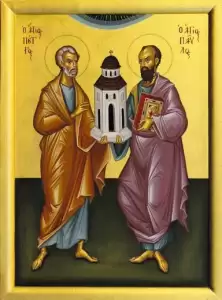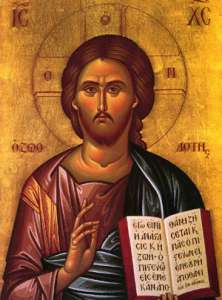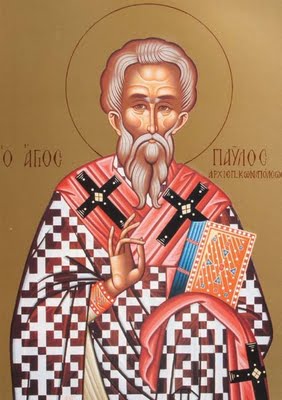Warning: Undefined array key "margin_above" in /home/stscahvallejo/public_html/wp-content/plugins/ultimate-social-media-icons/libs/controllers/sfsiocns_OnPosts.php on line 652
Warning: Undefined array key "margin_below" in /home/stscahvallejo/public_html/wp-content/plugins/ultimate-social-media-icons/libs/controllers/sfsiocns_OnPosts.php on line 653
Faith guides man to fear. To fear of what? To fear of sin, to fear of saddening God. The fearful person is humble. And he who is humble, has the Holy Spirit within him.
Elder Philotheos Zervakos of Paros
For Sunday, November 6
 Epistle Reading
Epistle Reading
The reading is from St. Paul's Letter to the Galatians 2:16-20
Brethren, knowing that a man is not justified by works of the law but through faith in Jesus Christ, even we have believed in Christ Jesus, in order to be justified by faith in Christ, and not by works of the law, because by works of the law shall no one be justified. But if, in our endeavor to be justified in Christ, we ourselves were found to be sinners, is Christ then an agent of sin? Certainly not! But if I build up again those things which I tore down, then I prove myself a transgressor. For I through the law died to the law, that I might live to God. I have been crucified with Christ; it is no longer I who live, but Christ who lives in me; and the life I now live in the flesh I live by faith in the Son of God, who loved me and gave himself for me.
Christ loved me
In the epistle reading for this Sunday, St. Paul expresses something profound with these three short words: [Christ] loved me. These are words we can and should say as well. Even a person who doesn't love Christ can say with all confidence that Christ loved him. The evidence for this is that Christ, the Son of God, willingly became incarnate, suffered, died, resurrected and ascended for all mankind out of love for us; and that includes you and me. And his love for us continues to this day. The difference is whether or not we understand and remember Christ's ultimate expression of love for us and how we respond to that love everyday. In the epistle reading, St. Paul remembers this love of Christ for him, and that is what we should do every day as well.
Whenever we are tempted to sin, we should remember the love of Christ and fight against the temptation by saying "Christ loved me", so that we don't sin against that love of Christ. Whenever we have failed to love someone, we should remember the love of Christ and say "Christ loved me" and try to do better, so that we also reflect that love of Christ towards others. Whenever we are feeling unloved, we should remember the love of Christ and say "Christ loved me" and be comforted.
Whether or not our hearts remembered his love and became vessels of Christ's love for others, will determine the fate of our souls when we die. On the one hand, we will experience his inescapable love there as the light of life. But if we have not loved him, that same light will be a fire within us burning with regret.
Questions:
- When do you feel most loved by Christ?
 Gospel Reading
Gospel Reading
Luke 8:41-56
At that time, there came to Jesus a man named Jairus, who was a ruler of the synagogue; and falling at Jesus' feet he besought him to come to his house, for he had an only daughter, about twelve years of age, and she was dying. As he went, the people pressed round him. And a woman who had had a flow of blood for twelve years and had spent all her living upon physicians and could not be healed by anyone, came up behind him, and touched the fringe of his garment; and immediately her flow of blood ceased. And Jesus said, "Who was it that touched me?" When all denied it, Peter and those who were with him said, "Master, the multitudes surround you and press upon you!" But Jesus said, "Some one touched me; for I perceive that power has gone forth from me." And when the woman saw that she was not hidden, she came trembling, and falling down before him declared in the presence of all the people why she had touched him, and how she had been immediately healed. And he said to her, "Daughter, your faith has made you well; go in peace." While he was still speaking, a man from the ruler's house came and said, "Your daughter is dead; do not trouble the Teacher any more." But Jesus on hearing this answered him, "Do not fear; only believe, and she shall be well." And when he came to the house, he permitted no one to enter with him, except Peter and John and James, and the father and mother of the child. And all were weeping and bewailing her; but he said, "Do not weep; for she is not dead but sleeping." And they laughed at him, knowing that she was dead. But taking her by the hand he called, saying, "Child, arise." And her spirit returned, and she got up at once; and he directed that something should be given her to eat. And her parents were amazed; but he charged them to tell no one what had happened.
Suffering deepens faith
Jesus returned from the country of the Gadarenes, and the multitude was waiting for Him, eager for both His teaching and His miracles. Then He was approached by a certain ruler of the synagogue, a man who was neither poor nor insignificant, but the foremost of society. The Evangelist even gives the man's name, so that the miracle might become the more renowned through this confirmable evidence of its truth. In his great need this man falls down before Jesus, although even without the urgency of this need, he ought to have fallen down and acknowledged Jesus as God. Nevertheless, affliction can compel a man to turn to what is better, as David says when he speaks of the horse or mule which has no understanding, whose jaws thou must afflict with bit and bridle when they come not nigh unto thee (Ps. 31:9). (1) But as Jesus went along the way to the house of Jairus, a woman drew near to Him who showed exceedingly great faith. She approached and touched the border of His garment with the firm faith that if she could only touch His clothing, she would be made whole. Immediately the flow of blood stopped. Like a man who brings his eye close to a bright light, or brings a dry stick close to fire, and they immediately react, so also the woman brought her faith close to Him Who has power to heal—and immediately she obtained healing. She gave no thought to anything else, neither the many years of her illness, nor the failure of her doctors. She only believed and was made whole. Understand that first she touched Jesus noetically, and only then did she touch Him bodily.
St. Theophylact of Ochrid
Reflection
That she touched Christ first noetically means that her nous (a Greek word meaning the eye of her soul, her inner heart), was full of determination, zeal, faith and belief that she would be healed by simply touching not even his body but merely the hem of his garment. This is exactly how we should approach Holy Communion; seeing that we are not merely touching the hem of his garment but receiving Christ's Holy Body and Blood entirely.

St. Paul the Confessor, Patriarch of Constantinople
Saint Paul was from Thessalonica. He became the secretary of Alexander, Patriarch of Constantinople (see Aug. 30), a deacon, and then the successor of Saint Alexander in about 337. Because of his virtue, his eloquence in teaching, and his zeal for Orthodoxy, the Arians hated and feared him. When the Arian Emperor Constantius, who was in Antioch, learned of Paul's election, he exiled Paul and proclaimed the Arian Eusebius Patriarch. Saint Paul went to Rome, where he found Saint Athanasius the Great also in exile. Provided with letters by Pope Julius, Paul returned to Constantinople, and after the death of Eusebius in 342, ascended again his rightful throne; the Arians meanwhile elected Macedonius, because he rejected the Son's con-substantiality with the Father (and the divinity of the Holy Spirit besides). When Constantius, yet at Antioch, learned of Paul's return, he sent troops to Constantinople to drive Paul out. The Saint returned to Rome, where Saint Athanasius also was again in exile. Constans, Emperor of the West, Constantius' brother, but Orthodox, wrote to Constantius that if Athanasius and Paul were not allowed to return to their sees, he would come with troops to restore them him-self. So Paul again returned to his throne. After the death of Constans, however, Constantius had Paul deposed. Because of the love of the people for Saint Paul, Philip the Prefect, who was sent for him, was compelled to arrest him secretly to avoid a sedition. Paul was banished to Cucusus, on the borders of Cilicia and Armenia; a town through which his most illustrious successor, Saint John Chrysostom would also pass on his way to Comana in his last exile. In Cucusus, about the year 350, as Saint Paul was celebrating the Divine Liturgy in the little house where he was a prisoner, the Arians strangled him with his own omophorion, so much did they fear him even in exile. His holy relics were brought back to Constantinople with honour by the Emperor Theodosius the Great. of Lyon to effect the Union, Joseph retired to a monastery. When the emperor died, his son recalled Joseph to the Patriarchate, but he resigned shortly before his death in 1283. Because of his stance against the union, St. Joseph was declared a confessor by his successor Gregory II.
What is a Confessor?
The saints of the church are often given specific titles that reflect what they are primarily remembered for. This could be such titles as Prophet, Martyr, Great-Martyr, Evangelist, Apostle, Enlightener, Equal to the Apostles, Theologian, Fool-for-Christ, God-bearing, Righteous, Wonderworker, Unmercenary Healer, and, as in St. Paul the Archbishop of Constantinople, a Confessor. The title Confessor should not be confused with the priest or spiritual father who hears confessions. When the title Confessor is used for a saint, it refers to someone who fought for, defended, and confessed the Orthodox Faith against heretics and heresies.
The heresy that St. Paul the Confessor fought against was Arianism. This heresy began with a 4th century priest from Alexandria named Arius. His heresy (false teaching) consisted of his belief that the Son of God was not co-eternal and consubstantial with His Father, but was rather a created being and subordinate to the Father. As described above, he suffered greatly for his opposition to the heresy, being exiled twice in order to silence him. His stance and teaching against the heresy was feared so much that the Arians resorted to murder. He was strangled with his omophorion, a special vestment worn by bishops around their shoulders that symbolizes their spiritual and ecclesiastical authority.
Arius's heresy was condemned by the First Ecumenical Council, in the city of Nicea in 325. The council's decision did not immediately stop Arianism, however, as its proponent quickly returned to the Emperor's favor. Even Arius' death, followed one year later by that of Constantine, did not lay the controversy to rest; that came about—in the Church, at least—through the teachings of the Cappadocian Fathers and the actions of the Second Ecumenical Council in 381. Arianism continued to linger in some Gothic and Vandal kingdoms of the West until it was finally suppressed in the seventh century. Arius's ideas are no longer accepted by any organized entity, though some modern sects like the Jehovah's Witnesses and Mormons display Arian tendencies in their doctrine.
Thank you for participating in SOFIA! If you've subscribed to our newsletter, look for an email notification next week when a new lesson page is posted. See you Sunday!

 Weekly catechism and spiritual devotion for the Orthodox home
Weekly catechism and spiritual devotion for the Orthodox home